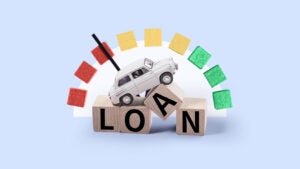8 tips for choosing the right first-time auto loan

Key takeaways
- Before shopping for your first auto loan, assess your budget to determine how much you can comfortably afford.
- When you’re ready to apply, shop around and get preapproved with at least three lenders to find the best deal and gain leverage when it’s time to negotiate at the dealership.
- You can also save big on your first auto loan by choosing a shorter loan term, making a down payment, exploring manufacturer specials or getting a cosigner.
Preparing to buy a car for the first time is stressful, and securing a good deal on your first auto loan requires research. The more time you dedicate at the front end, the better off your finances will be later. A low auto loan interest rate is the key to an affordable car, no matter what you buy.
1. Stick to your budget
When you buy your first car, consider two numbers — the monthly payment and the overall cost — to determine how much car you can afford. Experts recommend spending no more than 20 percent of your income on a car, including the monthly payment and other ownership costs like maintenance, insurance and fuel.
Finding the right size payment is a balancing act, though. Making small payments on an expensive car will result in paying much more interest over the long term, while larger payments can strain your budget each month. Use an auto loan calculator to estimate monthly payments and total interest paid. Then, check resources like Edmunds and Kelley Blue Book to see what you can expect to pay for the vehicles you are interested in buying.
Even if you buy an inexpensive car, you can quickly become upside down on your car loan, or owe more than it’s worth. For your first auto loan, choose the shortest term you can reasonably afford each month. It may mean you must cut back in other areas, but it is the best way to protect yourself from overpaying on interest.
2. Save for a big down payment
Once you know how much you can spend, start saving for a down payment that’s at least 20 percent of the vehicle’s total cost. A larger down payment improves your chances of a good interest rate, reduces your monthly payment and shrinks the interest you’ll pay over the loan’s course.
If you can’t afford this amount, aim for a down payment of at least 10 percent or whatever you can afford. Consider using Bankrate’s auto down payment calculator to find a figure that works for you.
It may be tempting to get a more expensive car, but first-time car buyers — and every car buyer — should use a down payment to reduce the amount they need to finance.
3. Review your credit report and score
Your credit score is the most important factor lenders consider when determining your interest rate. To get a good deal, you will need a history of on-time payments and a solid credit score. Lenders may also consider your current debts, income and other aspects of your income before approving you for your first auto loan.
Borrowers with the highest credit scores are approved for the lowest interest rates, while those with low scores or little credit history receive much higher rates. Over the life of a loan, that difference could cost you thousands of dollars.
For example, in the fourth quarter of 2024, the average auto loan interest rate on a new car for a borrower with good credit was 6.40 percent, while the average rate for a borrower with poor credit was 13.08 percent. For a $45,000 auto loan with a term of 60 months, this is how much you could save with a higher credit score:
| Monthly payment | Total interest paid | |
|---|---|---|
| Good credit (661 to 780) | $878 | $7,702 |
| Fair credit (501 to 600) | $1,026 | $16,544 |
If you haven’t had the chance to build your credit score and history, you’ll have a harder time finding a good deal. You may have to use in-house dealership financing, which means a higher interest rate, so try to improve your credit score and build a history of on-time payments. A low debt-to-income ratio also shows lenders you can handle your finances. Paint a good financial picture for your lenders to score a good deal.
Consider using a co-signer or co-borrower
If you don’t have stellar credit, or you don’t have an established credit history, a cosigner or co-borrower could help your chances of getting a good deal. The lender will consider both credit scores when deciding whether to finance your vehicle.
A cosigner doesn’t have rights to the vehicle but will be responsible for the loan if you cannot make timely payments. A co-borrower shares ownership of the vehicle and equal responsibility for the loan with you. Regardless of which you select, the individual should have good or excellent credit and a steady source of verifiable income that meets the lender’s minimum threshold for approval.
4. Shop more than one lender
Comparing lenders is just as critical as comparing cars if you want a good deal. Since auto loans are common, you have a variety of options to choose from.
- Banks: Larger banks tend to have strict requirements for auto loan applications, but if you have an existing relationship, you may be able to qualify. As a first-time buyer, you may face higher rates.
- Credit unions: If you have little or no credit history, you may be eligible for a first-time car buyer program offered through a local credit union. For most credit unions, you will need to become a member to apply.
- Online lenders: Online lenders generally have fewer eligibility requirements than traditional banks. This is good news if you don’t have much credit history or a high score, but you can expect a higher interest rate to offset the risk of default posed to the lender.
- Loan marketplaces: These online platforms feature an extensive network of lenders. Submitting an application shares it with the network so you can view potential loan offers with lenders who could be a good match. You will then need to complete a separate application with the lender.
- Captive lenders: You can also secure financing through a captive lender, or the finance company belonging to the auto manufacturer. They often feature auto loan programs for currently enrolled students and recent college graduates.
- Dealership financing: If you are unable to secure an auto loan from a lender before you shop, dealerships have financing options available. However, you may need to rely on an expensive buy here, pay here option that can put a strain on your budget.
Every lender has different rates and ways of calculating who gets what terms. It is critical to shop around and apply with multiple lenders to see what you qualify for, how much you can spend and what you can expect to pay each month.
5. Apply for preapproval
Shopping around has an added benefit: You may be able to get a preapproved offer that lasts 30 to 60 days. Preapproval gives you time to shop around for a ride knowing you’ve locked in funding at a fixed rate.
Preapprovals require a hard credit inquiry but give you leverage when it’s time to negotiate the purchase price at the dealership. You may also be able to negotiate a better deal on in-house financing — if that’s the route you want to go — with a preapproval letter in hand.
6. Check out manufacturer specials
Manufacturers offer rebates, 0% APR deals and special leases on new models. Keep an eye out for these. You will be more limited in what you can buy and how you can pay for it. But if you already have a clear idea of what you want and excellent credit, manufacturer specials can save you money on your first auto loan.
Some dealers also offer the choice between an auto rebate or low-interest financing. If you have already managed to secure unbeatable rates with another lender, your choice is clear: Reward yourself with a rebate.
7. Look into first-time car buyer programs
Some manufacturers, such as Honda, offer first-time car buyer programs and discounts through select dealerships. Some even offer special deals for college students and recent grads who fall into this category. If you are planning on buying a new car, have the income and credit to back you up and want in-house financing, it makes sense to see if you can get a little money off.
Ask the lender about eligibility guidelines and how to move forward with applying for a loan. You’ll generally need to be at least 18 years of age and have a steady source of income. In some instances, a down payment is also required. Some lenders will also limit the automobiles you can choose from if seeking financing through a first-time car buyer program.
Bottom line
The key to getting a good deal on your first auto loan is to stay patient and shop around. You can walk away with a competitive rate by comparing lenders, saving up a down payment and working on your credit score.
Why we ask for feedback Your feedback helps us improve our content and services. It takes less than a minute to complete.
Your responses are anonymous and will only be used for improving our website.
You may also like

Can you use a personal loan to buy a car?

How to build credit to buy a car: 4 tips

How to get a car loan with bad credit



